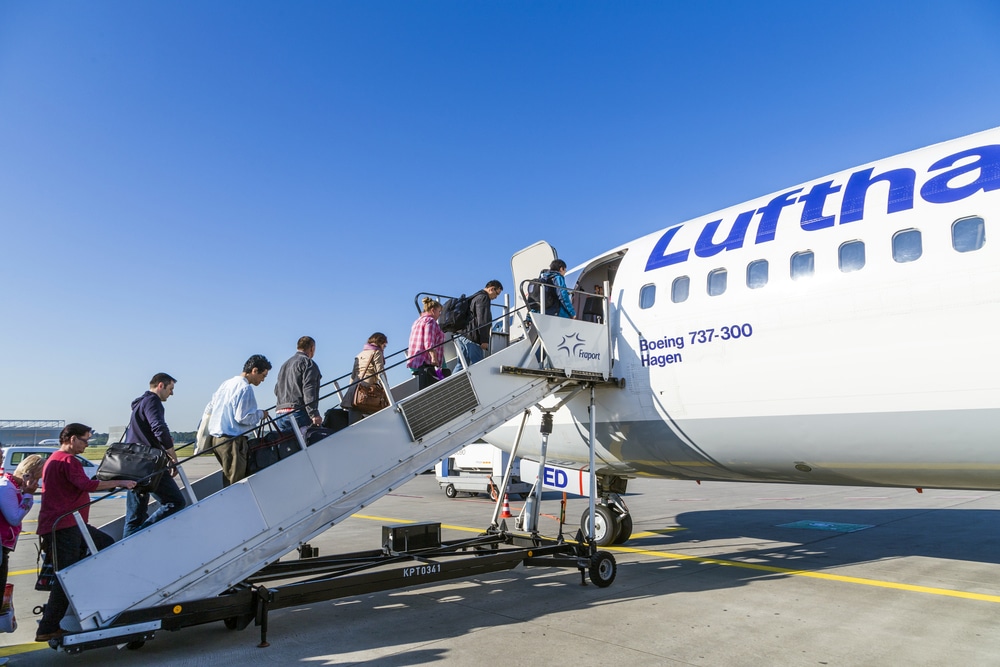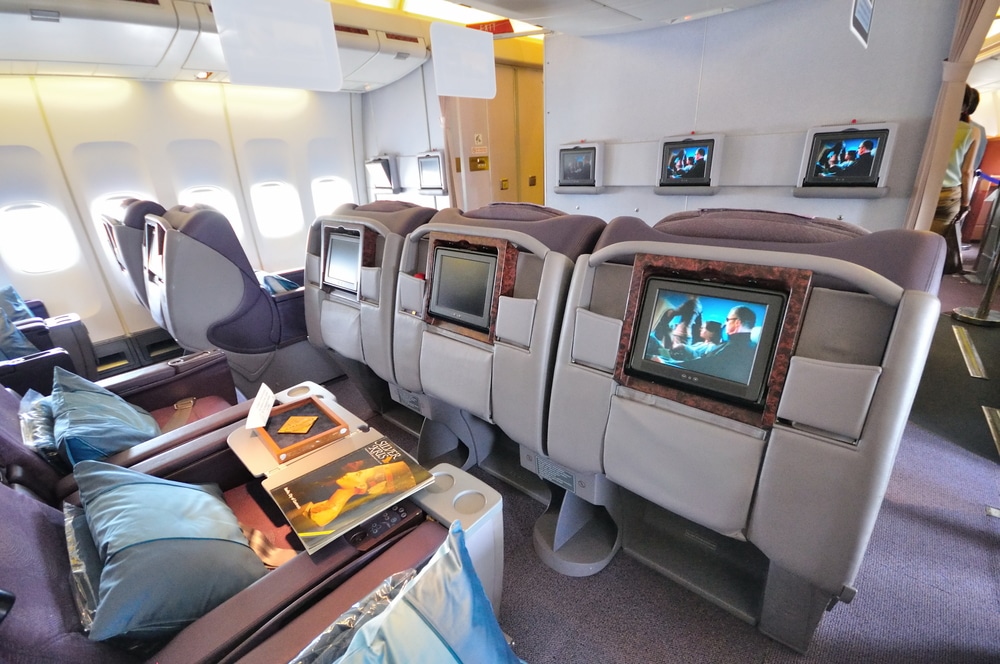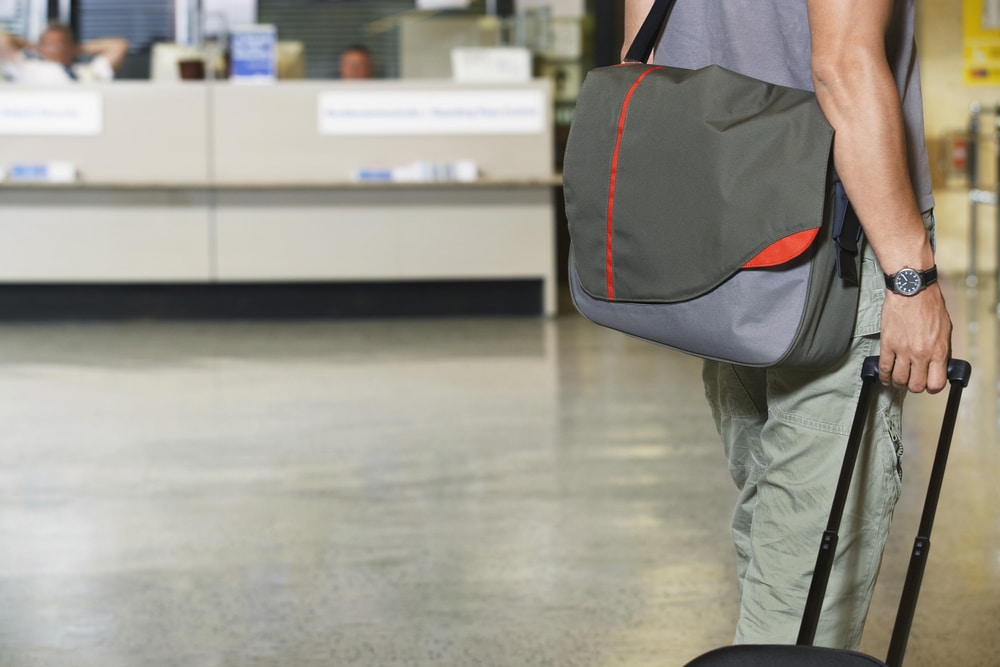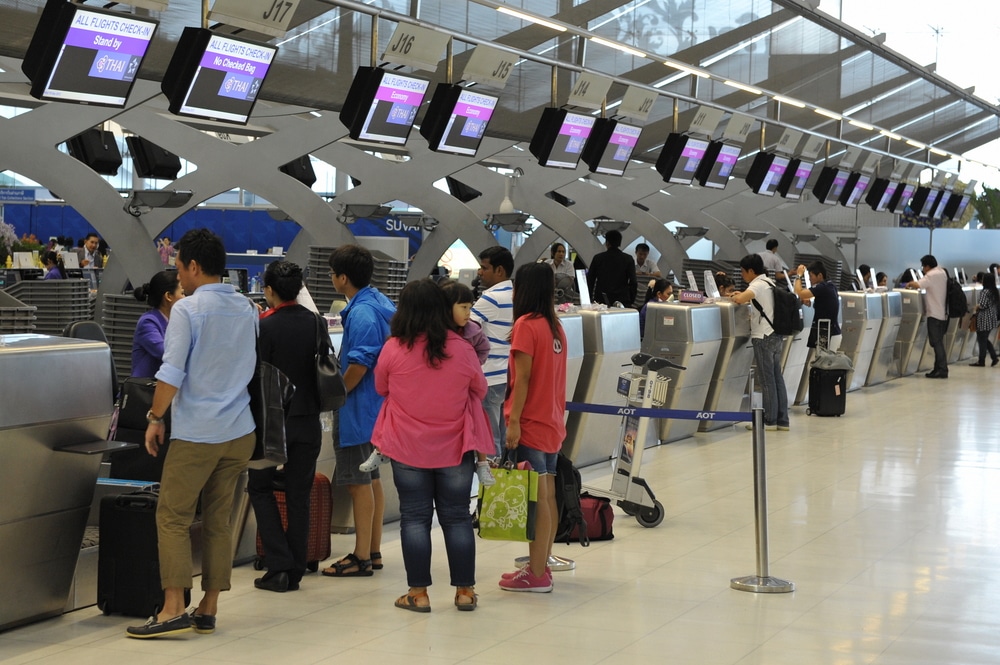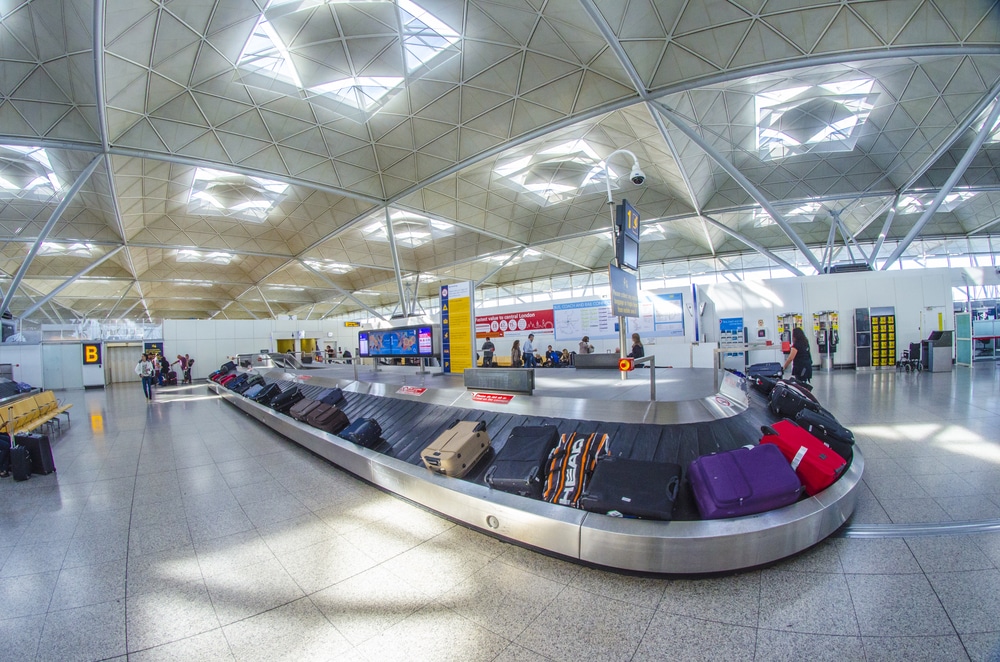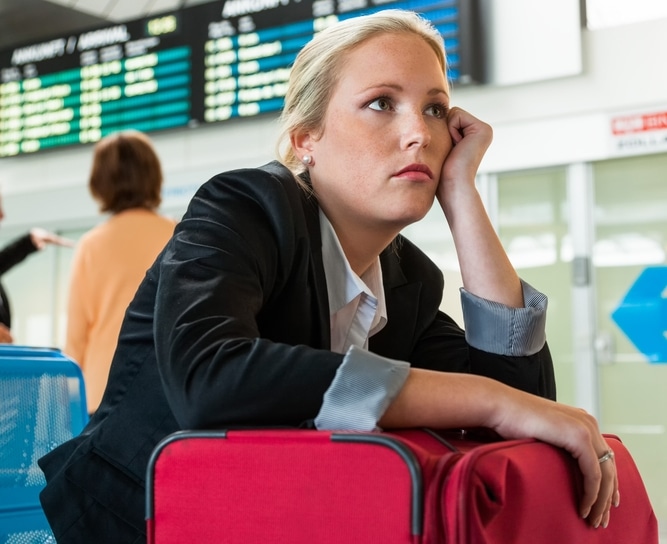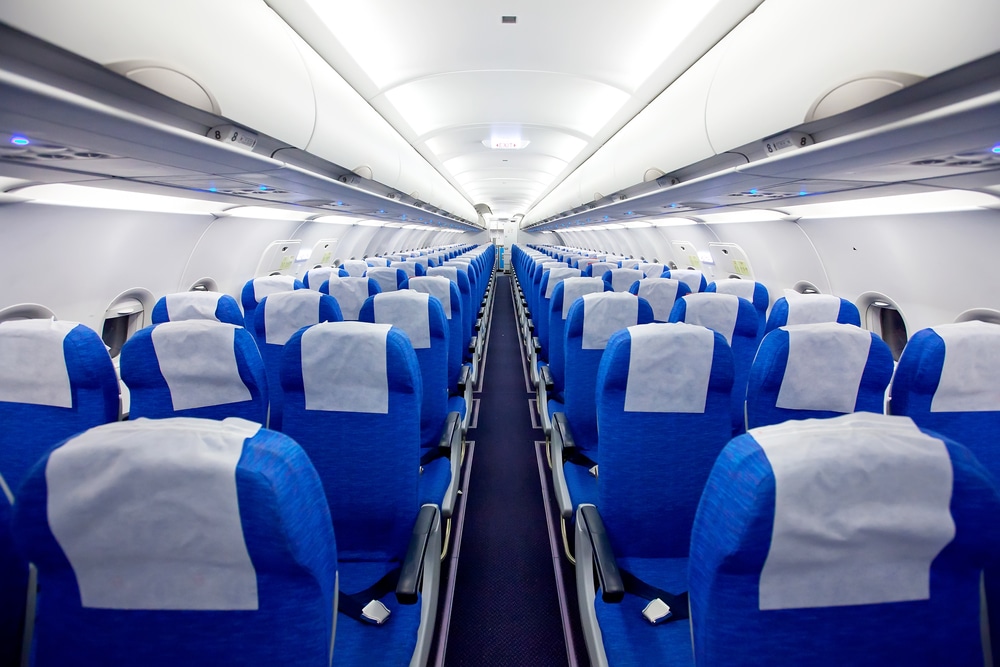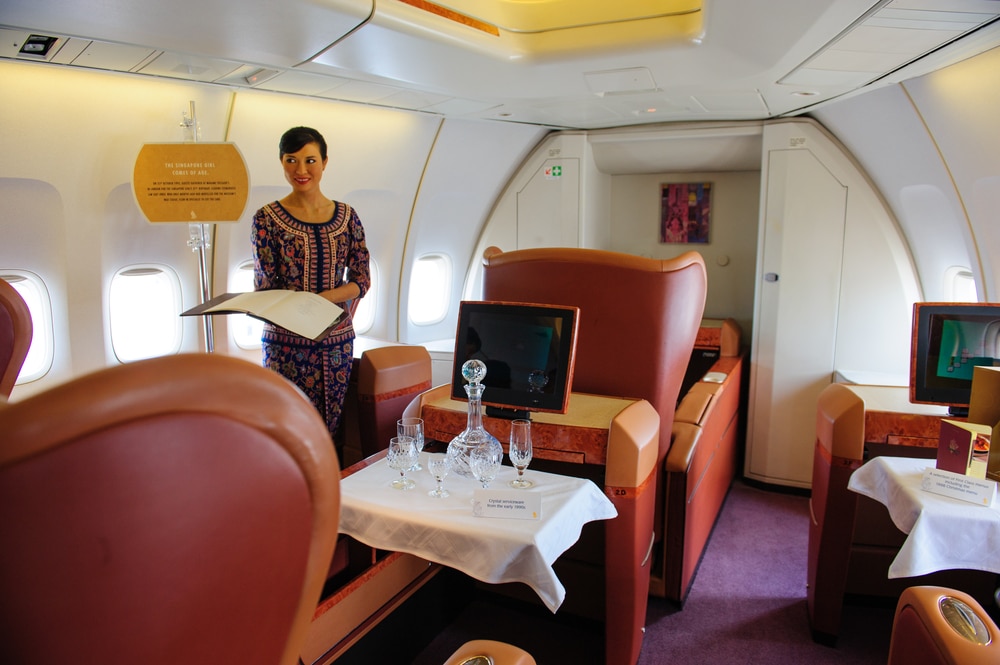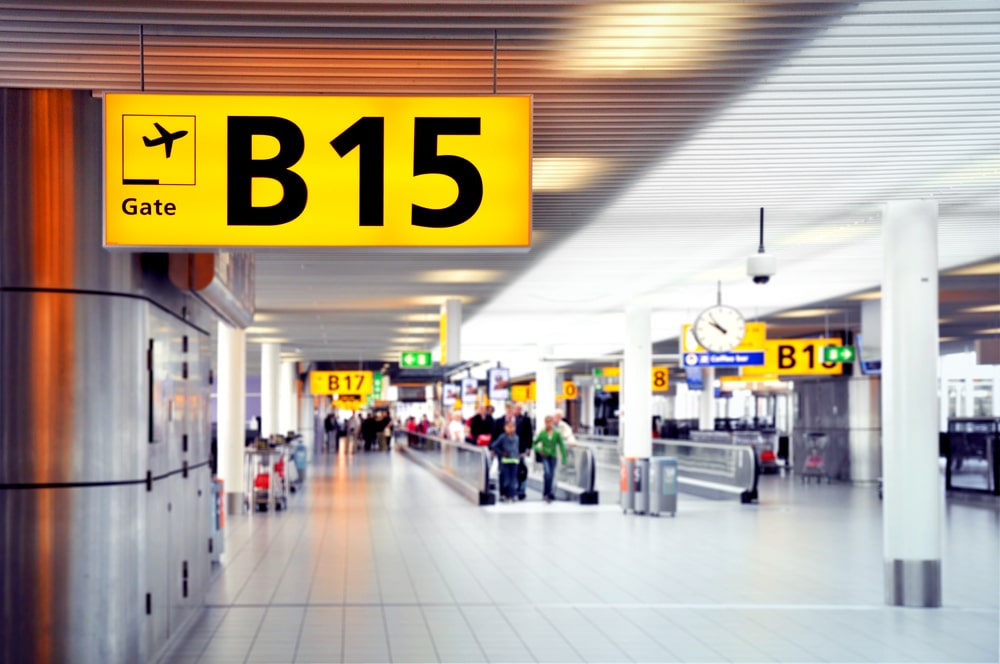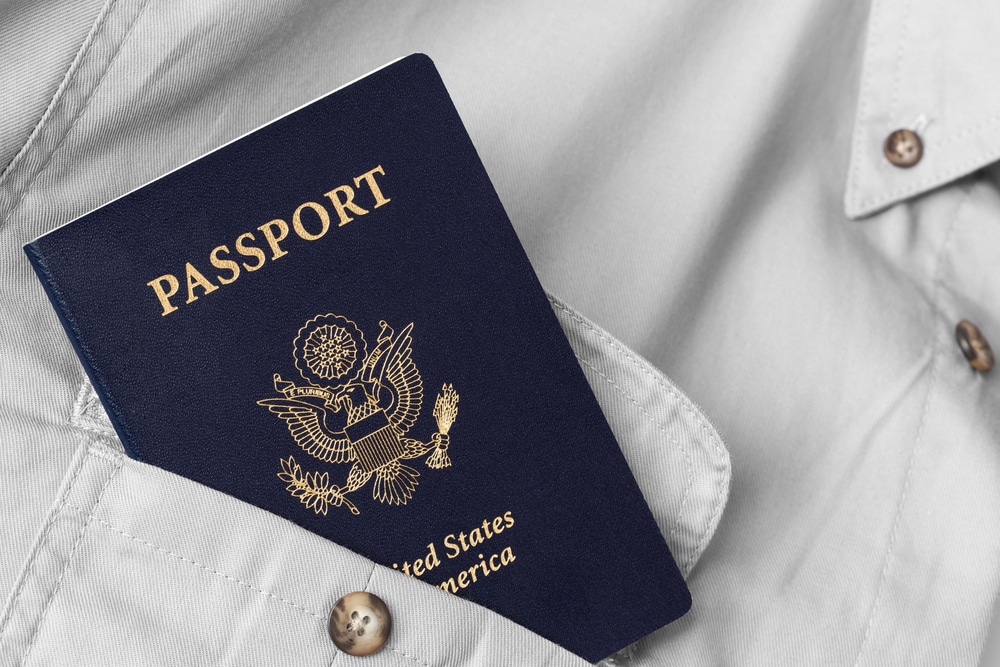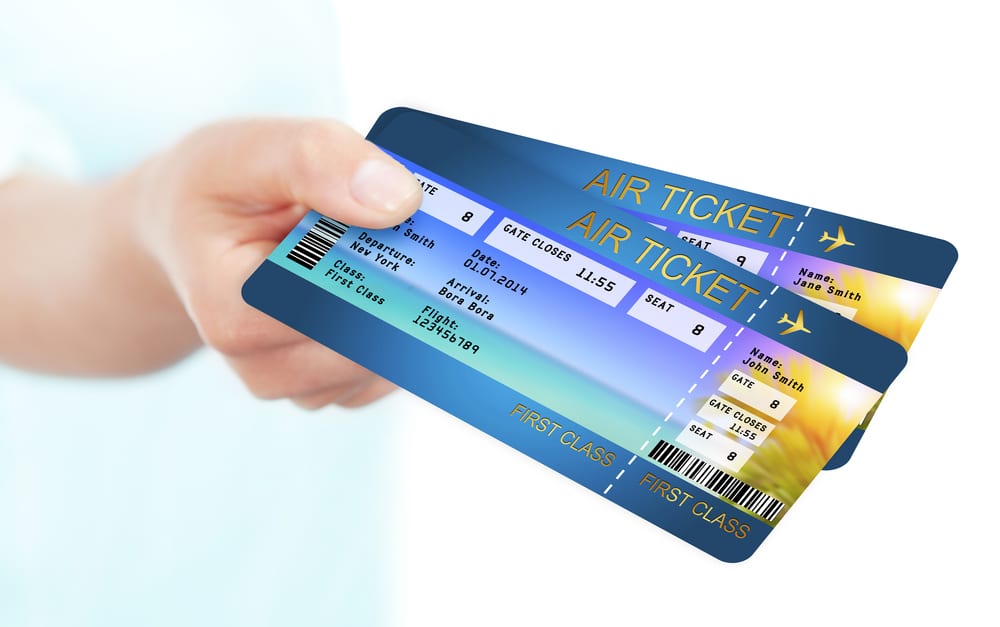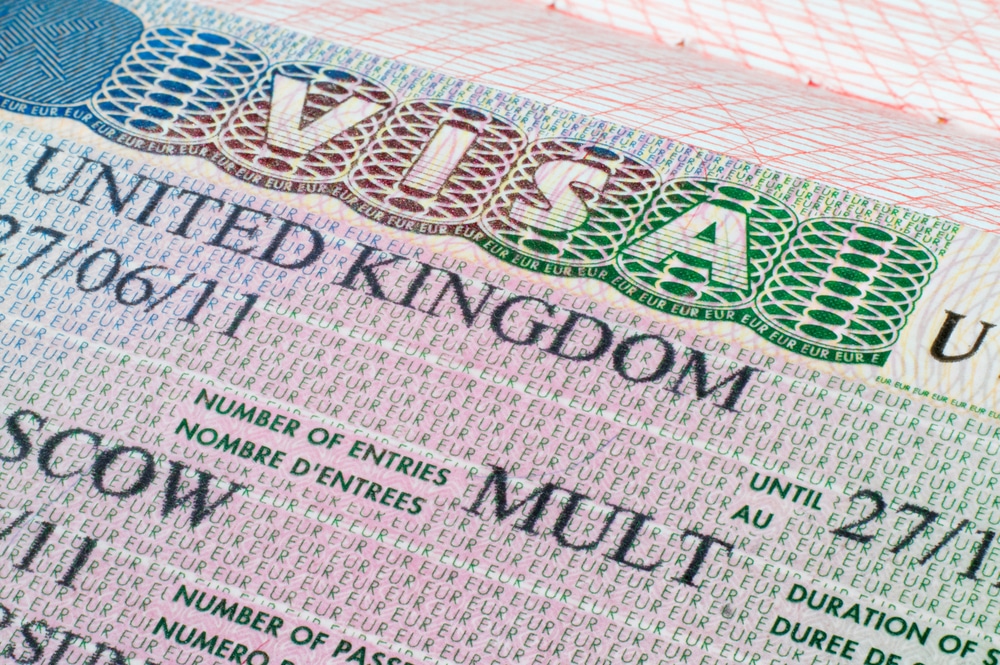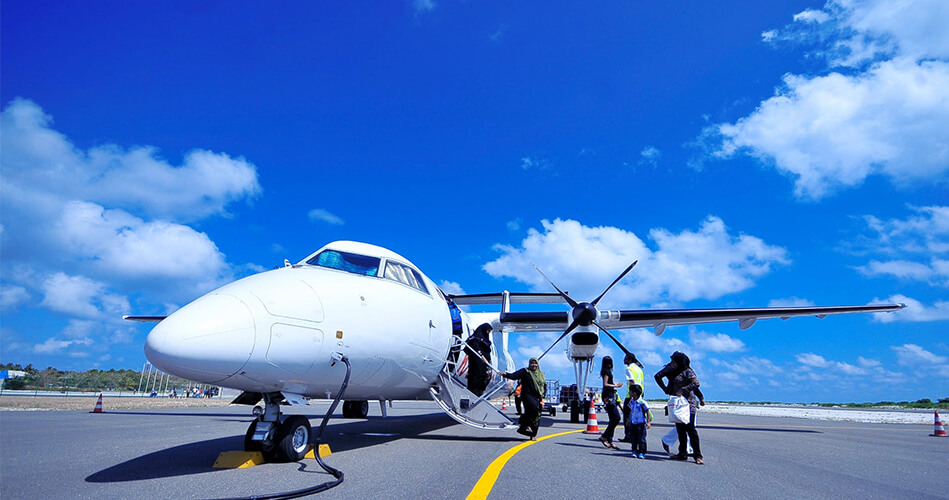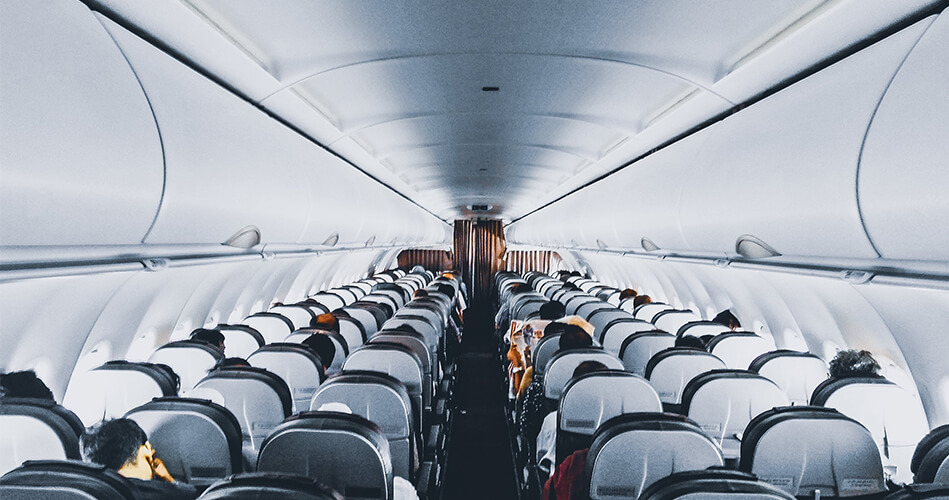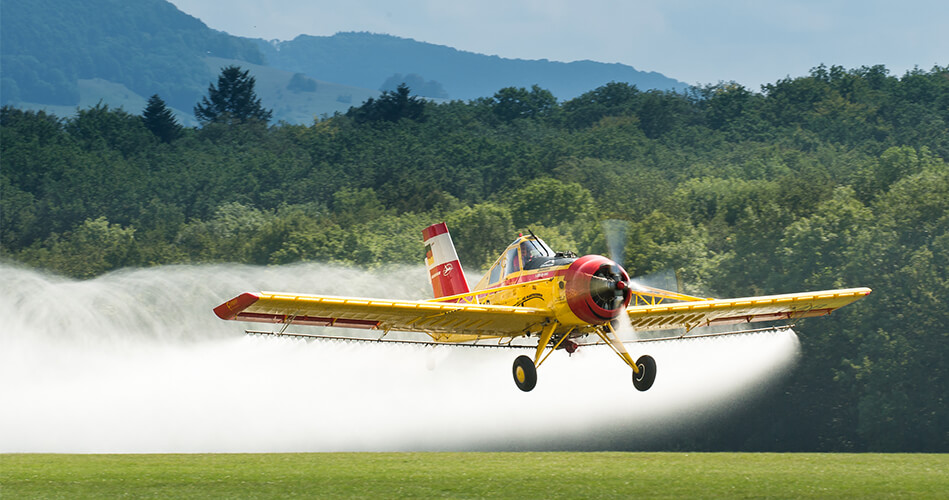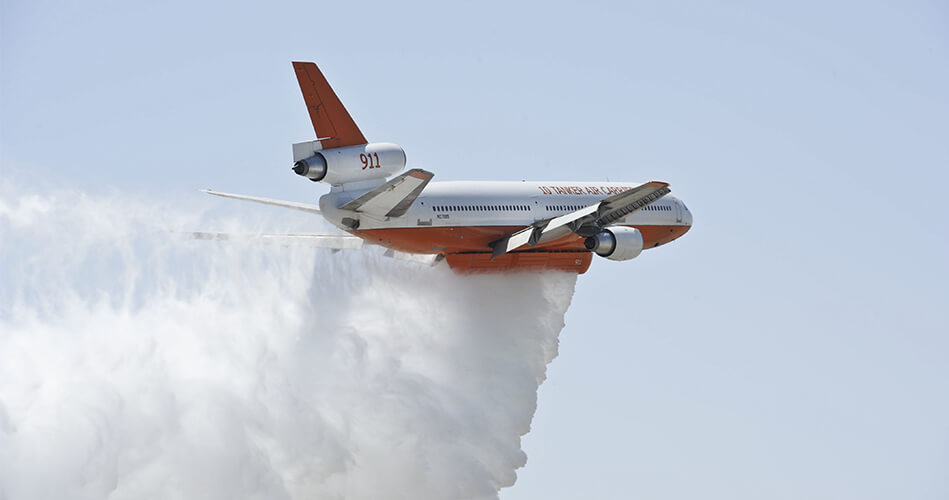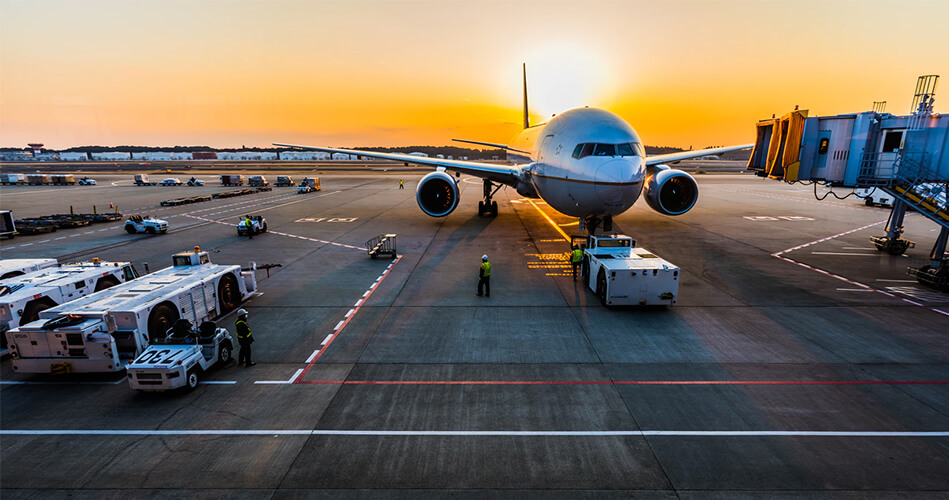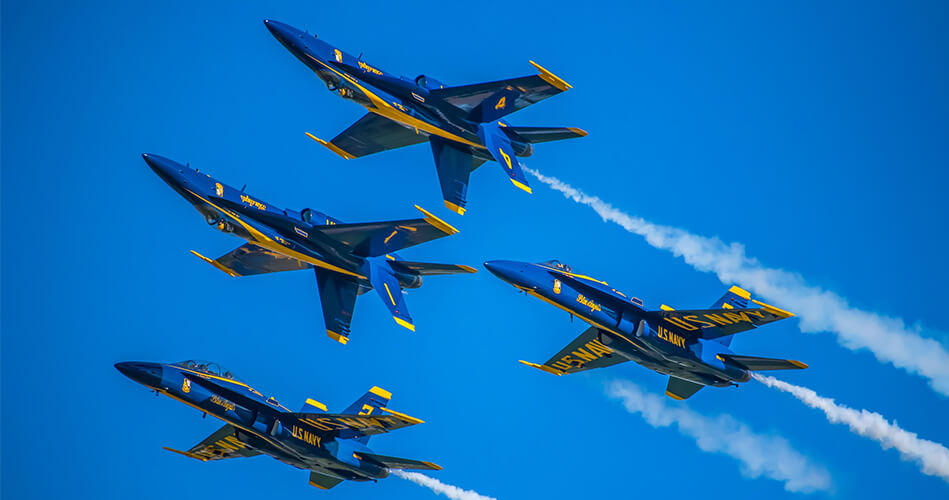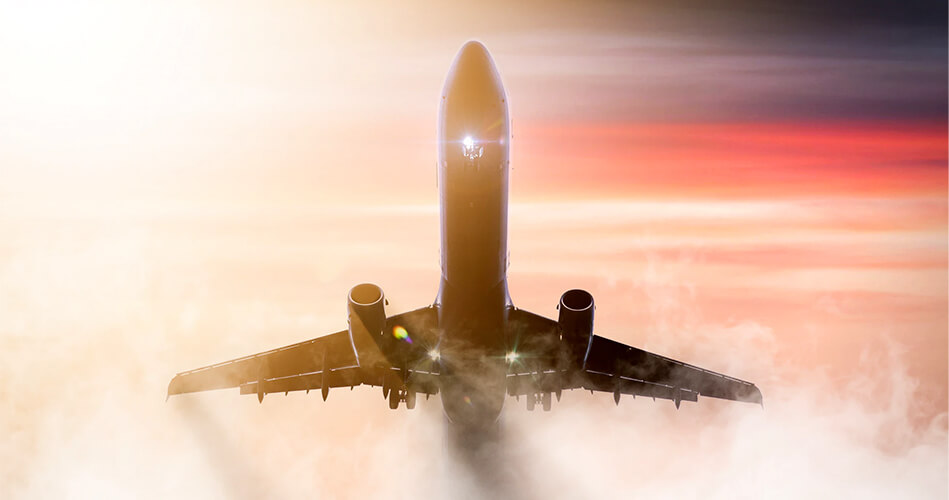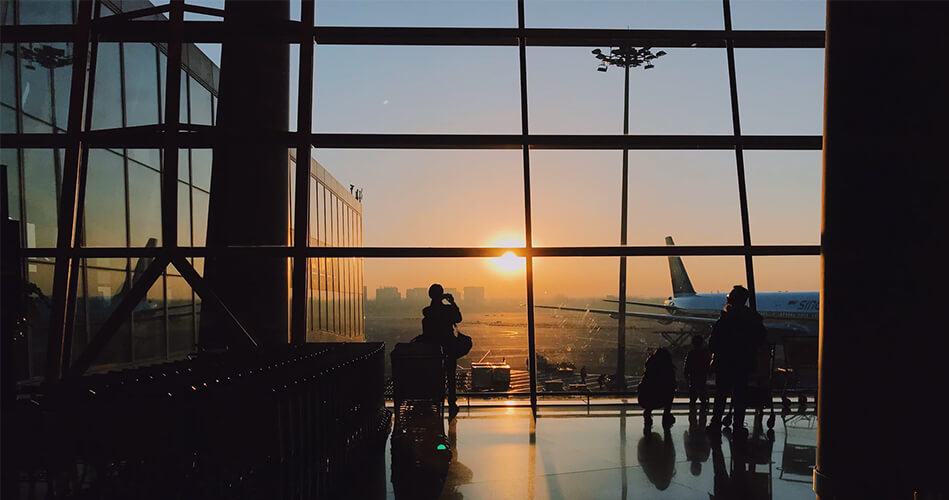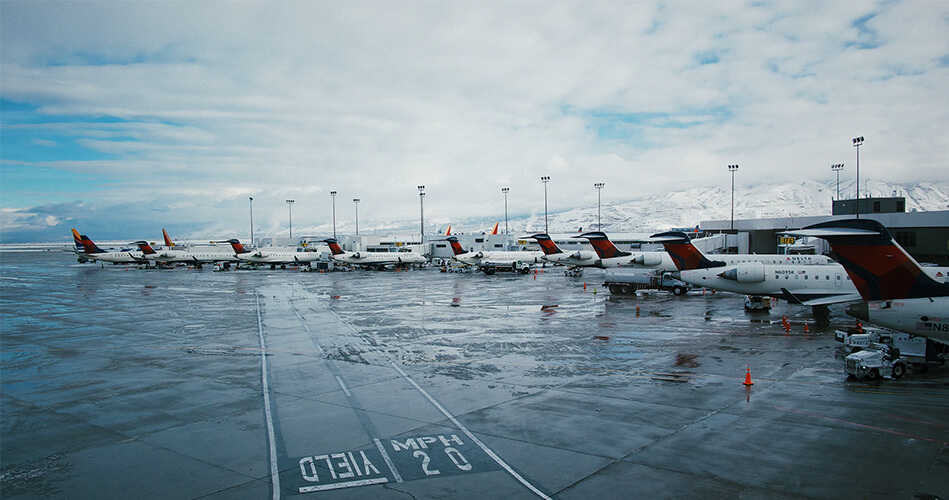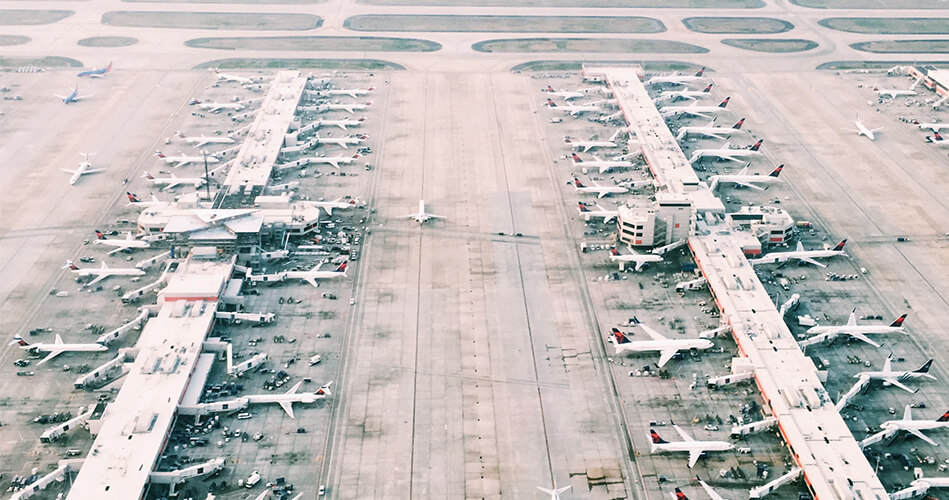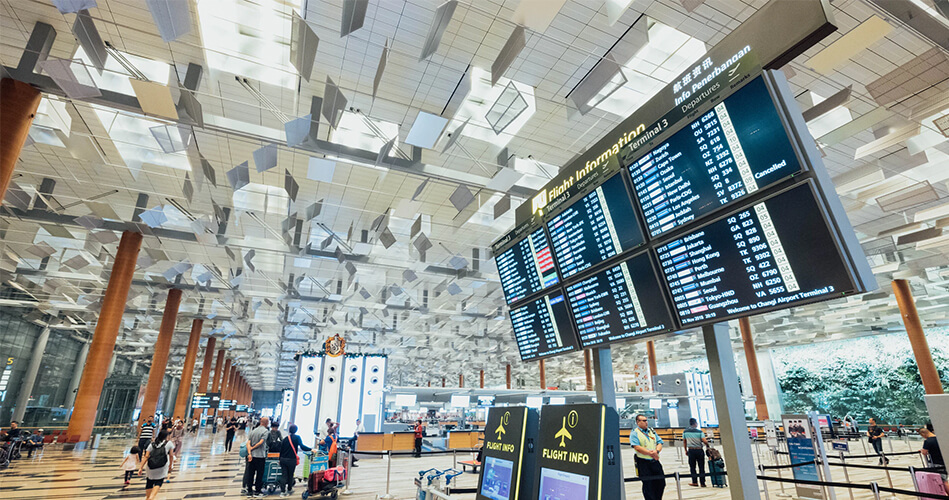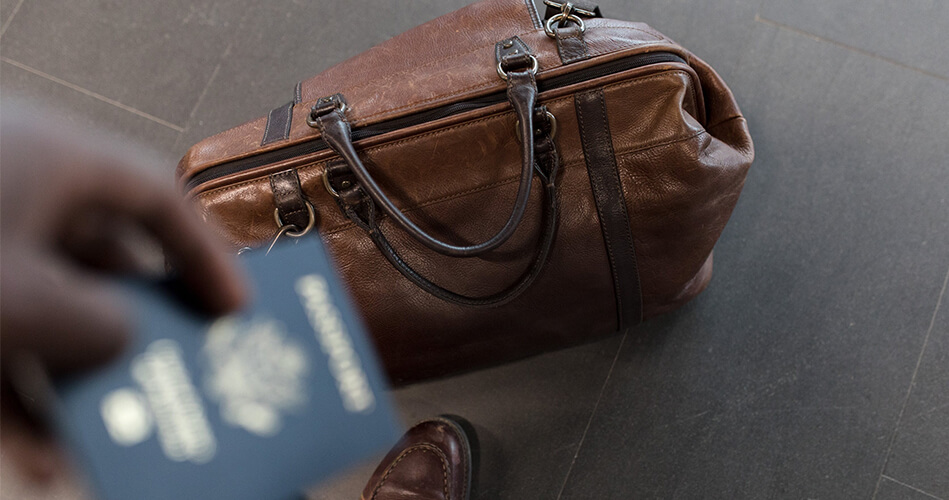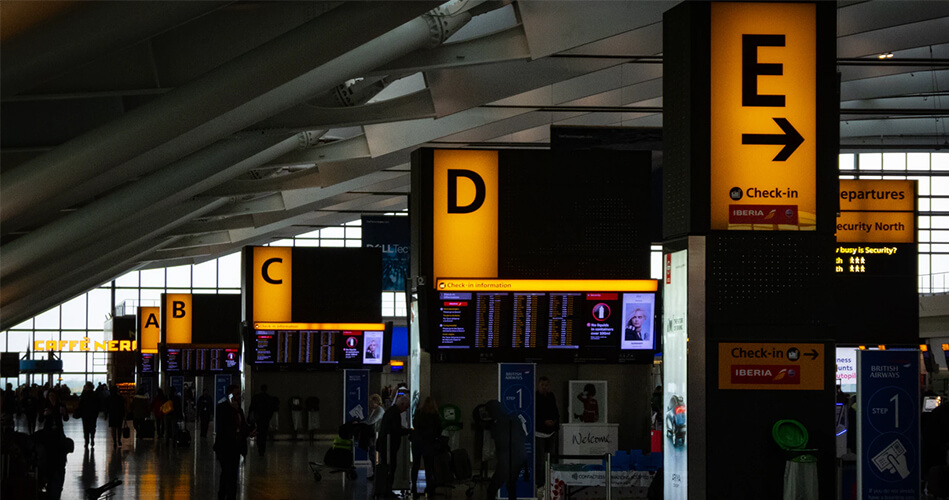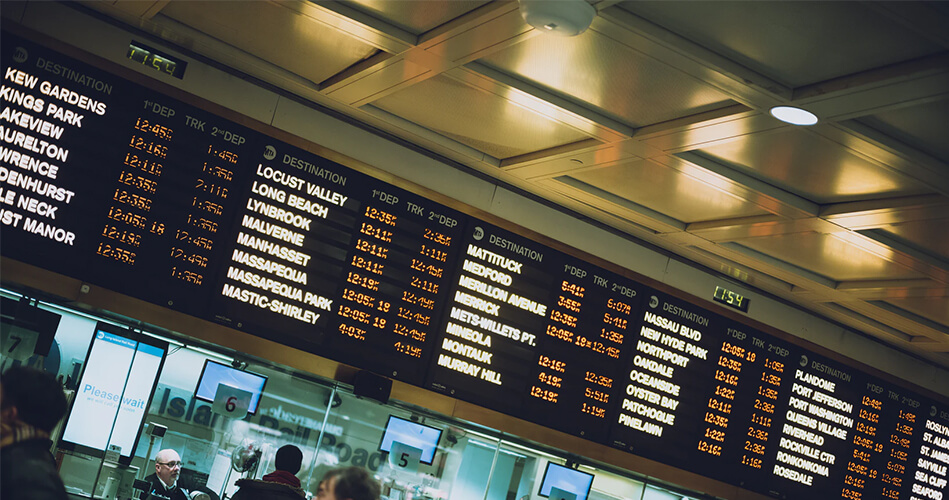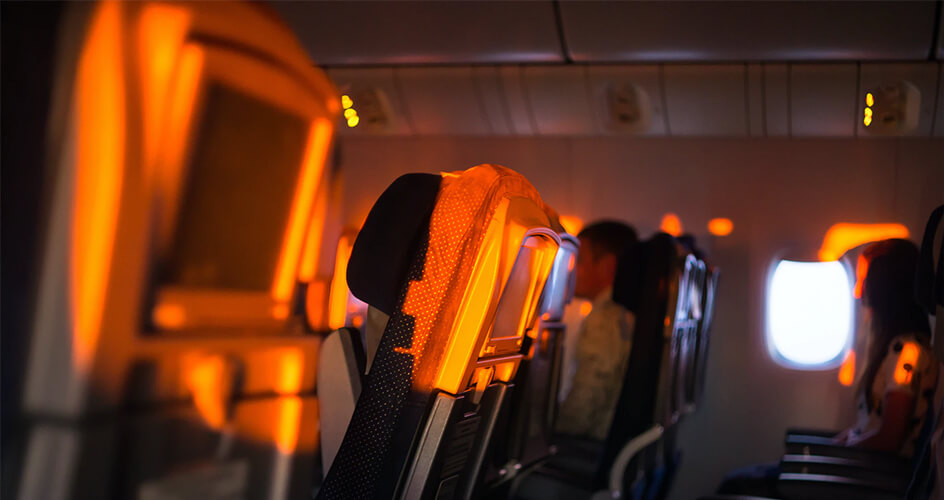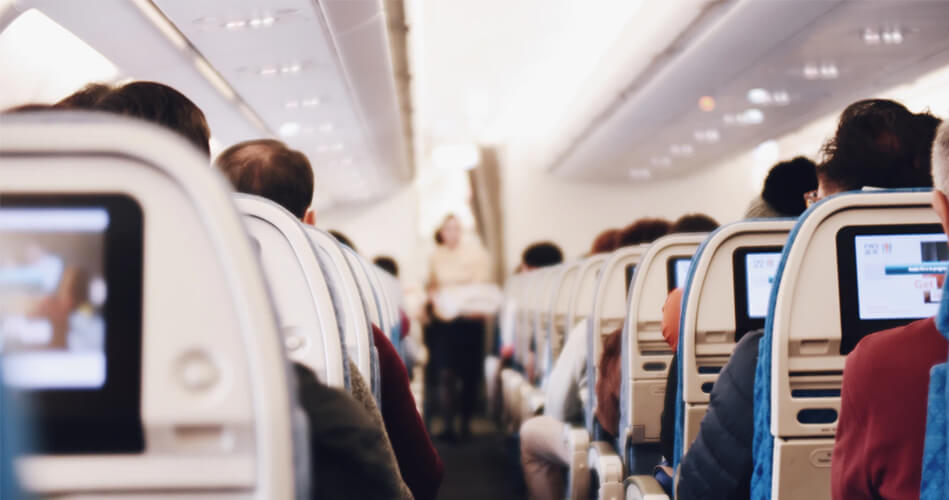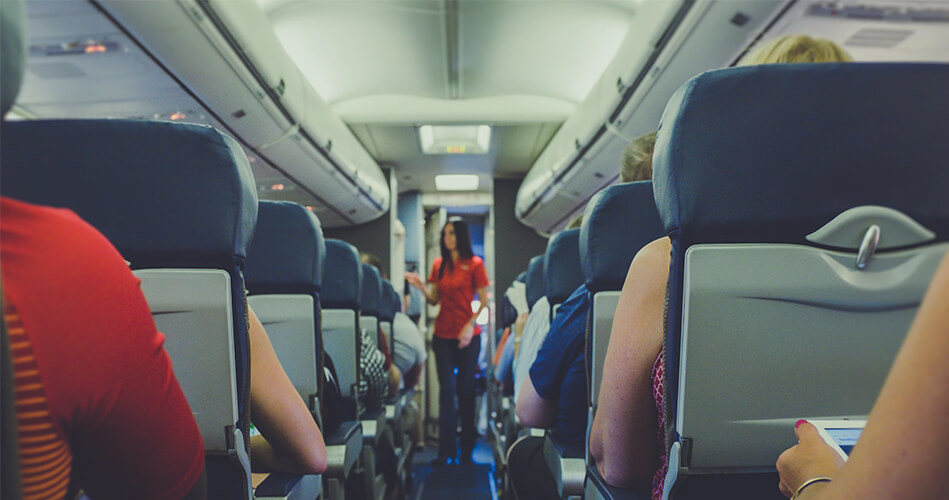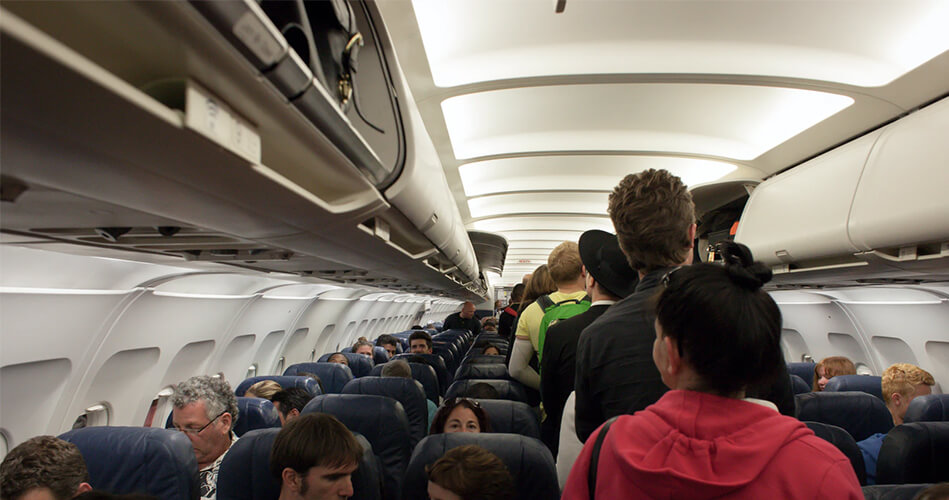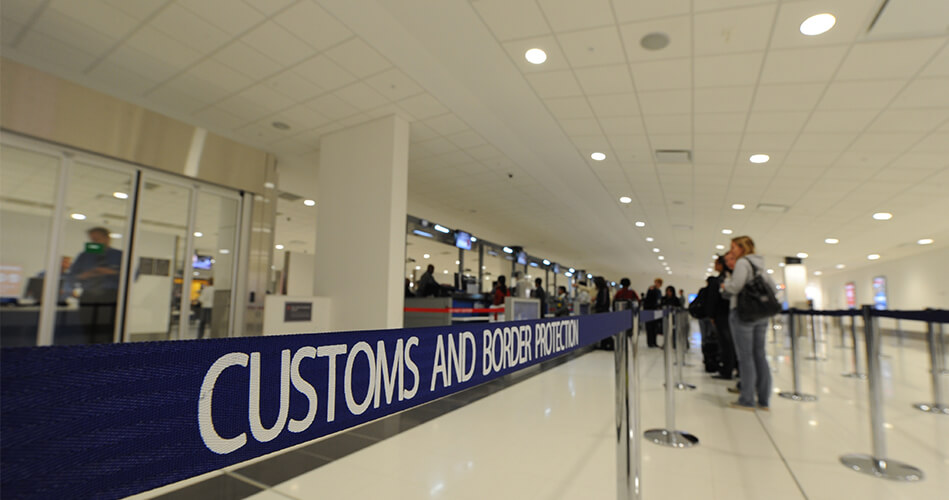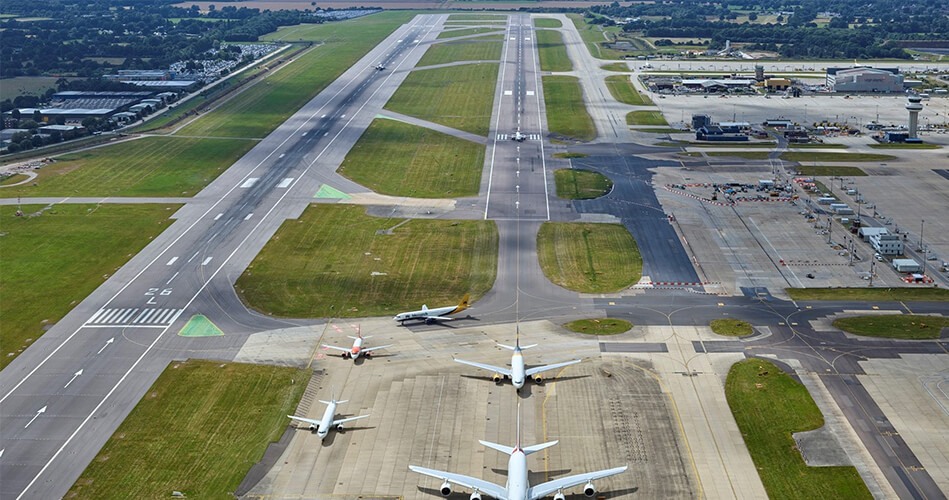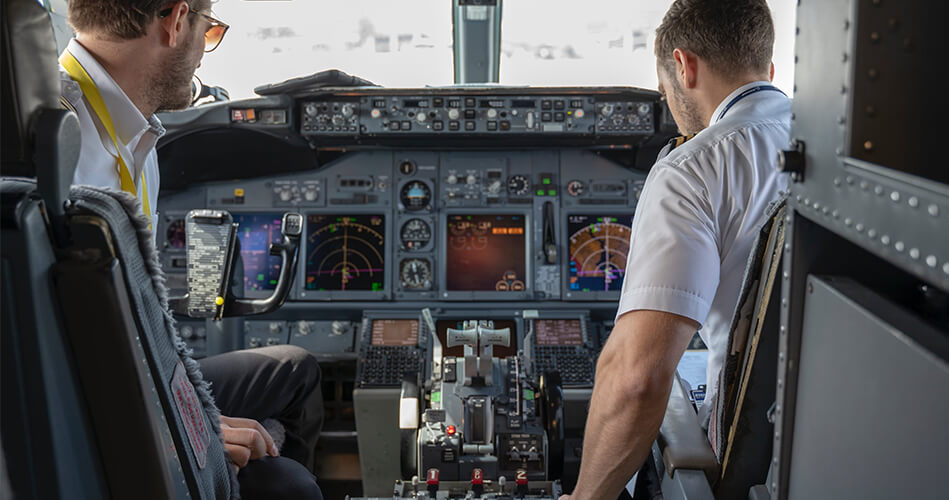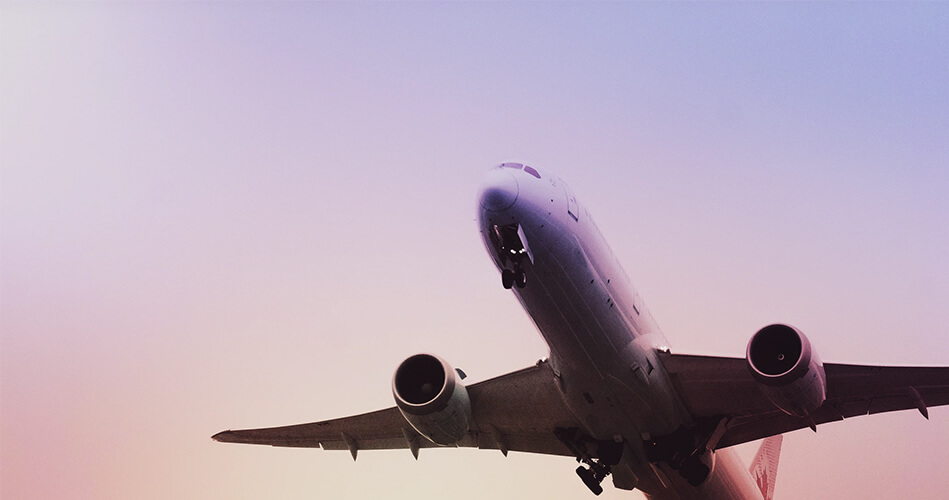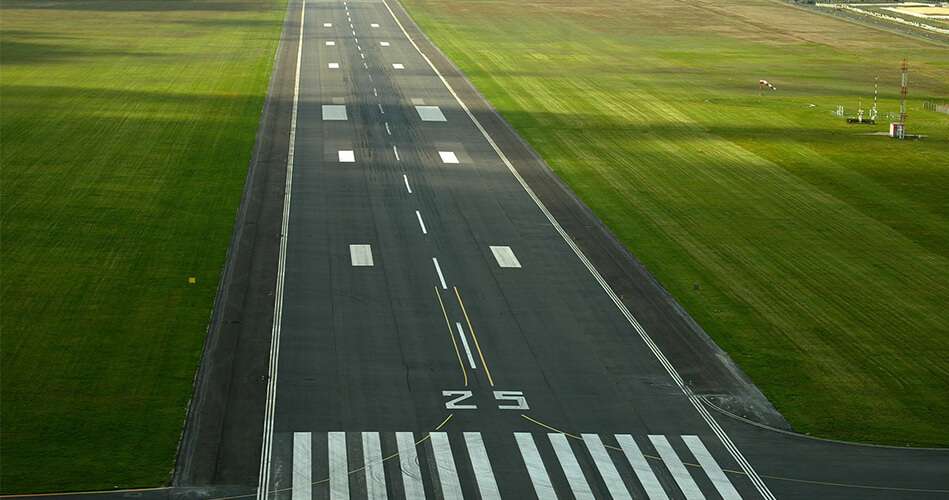Подготовь свой английский к летнему путешествию! Предлагаем тебе исчерпывающий словарь на тему Air Travel на английском языке.
Airport Vocabulary
1. Airport [ˈɛrˌpɔrt ] – Аэропорт
2. Airplane, plane [ˈɛrˌpleɪn, pleɪn] – Самолет
3. Baggage Claim [ˈbægəʤ kleɪm] – Получение багажа
4. Fly [flaɪ] – Лететь
5. Flight [flaɪt] – Рейс, полет
6. Immigration [ˌɪməˈgreɪʃən ] – Иммиграционная служба
7. Immigration control [ˌɪməˈgreɪʃən kənˈtroʊl] – Иммиграционный контроль
8. Customs [ˈkʌstəmz ] – Таможня
9. Customs Officer [ˈkʌstəmz ˈɔfəsər] – Служащий таможни
10. Green/red channel [grin/rɛd ˈʧænəl] – Зеленый/красный коридор
11. Information [ˌɪnfərˈmeɪʃən ] – Справочное бюро
12. Check-in counter/desk [ʧɛk-ɪn ˈkaʊntər/dɛsk] – Стойка регистрации
13. Arrivals [əˈraɪvəlz] – Прибытие
14. Departures [dɪˈpɑrʧərz ] – Отправление
15. Destination [ˌdɛstɪˈneɪʃən ] – Место назначения
16. Passport [ˈpæˌspɔrt ] – Паспорт
17. Passport control [ˈpæˌspɔrt kənˈtroʊl] – Паспортный контроль
18. Ticket [ˈtɪkət] – Билет
19. Visa [ˈvizə ] – Виза
20. Ticket counter [ˈtɪkət ˈkaʊntər] – Билетная касса
21. Declare [dɪˈklɛr ] – Декларировать
22. Luggage [ˈlʌgəʤ ] – Багаж
23. Hand luggage/Carry-on luggage [hænd ˈlʌgəʤ/ˈkæri-ɑn ˈlʌgəʤ] – Ручной багаж
24. Bags [bægz ] – Сумки, вещи
25. Conveyor belt [kənˈveɪər bɛlt] – Транспортер (конвейер)
26. Luggage tags/labels [ˈlʌgəʤ tægz/ˈleɪbəlz] – Бирки на багаже
27. Trolley [ˈtrɑli ] – Тележка
28. Schedule [ˈskɛʤʊl] – Расписание
29. Boarding [ˈbɔrdɪŋ ] – Посадка
30. Boarding pass [ˈbɔrdɪŋ pæs] – Посадочный талон
31. Terminal [ˈtɜrmənəl ] – Терминал
32. Departure gate [dɪˈpɑrʧər geɪt ] – Выход (на посадку в самолет)
33. Departure lounge [dɪˈpɑrʧər laʊnʤ] – Зал ожидания (перед выходом на посадку)
34. Departures board [dɪˈpɑrʧərz bɔrd] – Табло
35. Duty free shop [ ˈduti fri ʃɑp] – Магазин беспошлинной торговли
36. Seat [sit ] – Сиденье
37. Delay [dɪˈleɪ ] – Задержка
38. Aisle seat [aɪl sit] – Сиденье у прохода
39. Passenger [ˈpæsənʤər ] – Пассажир
40. Flight attendant [flaɪt əˈtɛndənt] – Стюардесса / Стюард
Полезные словосочетания
- to travel by air – путешествовать самолётом
- adult’s fare – взрослый билет
- child’s fare – детский билет
- one-way ticket – билет в один конец
- round trip ticket (a return ticket) – билет туда и обратно
- package tour – комплексное турне
- direct trip (a non-stop flight) – беспосадочный рейс
- destination – назначение, место назначения
- domestic flights – внутренние рейсы
- international flights – международные рейсы
- first-rate seat – место в первом классе
- I.D. card (I.D. – identification) – удостоверение личности
- nonsmoking section – места для некурящих
– I’d like two seats in the nonsmoking section, please.
- smoking section – места для курящих
- to cancel a reservation – отменить резервирование билета
- to confirm a reservation on the phone – подтвердить заказ билет по телефону
- to fill out a form – заполнит бланк
- to hold a reservation – оставить заказ за клиентом
- crew – экипаж
- air hostess – стюардесса (stewardess)
- navigator – штурман
- pilot – пилот
- air terminal – аэровокзал
- boarding – посадка на самолёт
- boarding pass – посадочный талон (пропуск)
- check in – зарегистрироваться
- check-in – регистрация
- baggage check – багажная квитанция (claim tag)
- be overweight – весить слишком много (о багаже)
- be underweight – весить слишком мало
- excess weight – лишний вес
- desk – конторка
- to register a ticket at the desk – зарегистрировать билет в билетной стойке
- lounge – зал ожидания
- transit launge – зал для транзитных пассажиров
- gate – вход, выход; калитка, ворота
- waiting room – зал ожидания
- runway – взлётная полоса
- altitude – высота (над уровнем моря)
- to lose altitude – терять высоту
- crash – катастрофа
- speed – скорость
- hijacking – угон самолёта
- disembark – 1. высадка 2. высаживать, выгружать
- landing – посадка самолёта
- take-off – взлёт
- to board the plane – садиться на борт самолёта
- cabin – каюта, салон самолёта
- cockpit – кабина пилотов
- fuselage / body – фюзеляж
- undercarriage – шасси
- wing – крыло
- tail – хвост
- aisle – проход
- window – окно
Надписи и указатели
- EMERGENCY EXIT – Аварийный выход
- FASTEN SEAT BELTS – Застегните ремни безопасности
- FLUSH – Смыть воду (в туалете)
- STAFF ONLY – Только для персонала
- TOILET / LAVATORY OCCUPIED – Туалет занят
- TOILET / LAVATORY VACANT – Туалет свободен
- ARRIVALS – Прибытие
- DEPARTURES – Отправление
Подпишись, чтобы не пропустить свежие статьи!
Подписаться
- About Us & Legal Info
- Partner Program
- Contact Us
- Privacy Notice
- Terms of Use
- Pronunciation Symbols
- Help
© 2023 Encyclopædia Britannica, Inc.
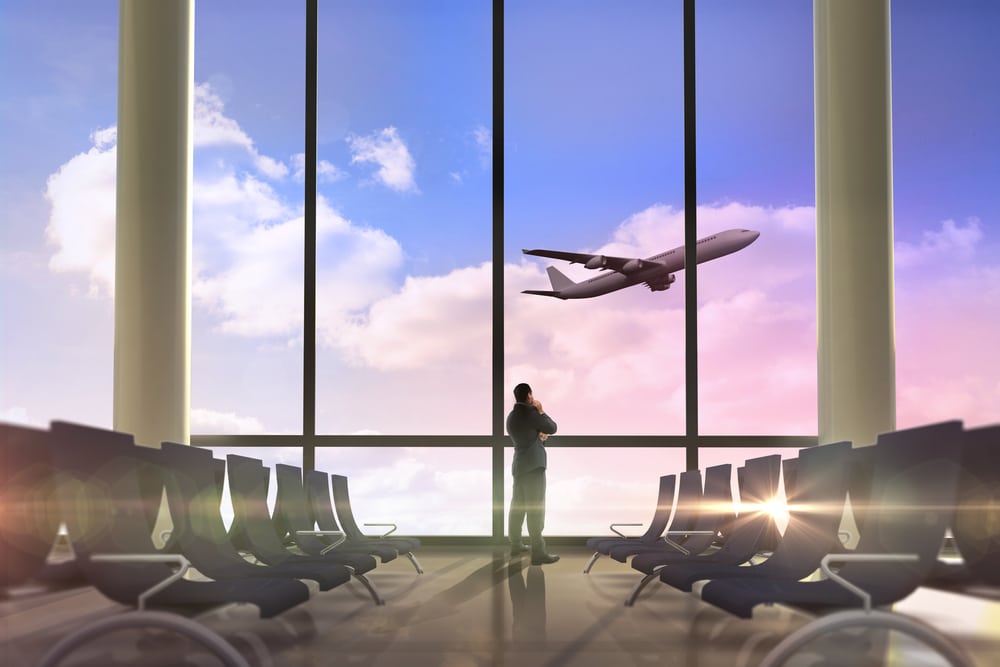
By
Last updated:
April 24, 2022
Having to speak another language while traveling can be very stressful.
Especially at an airport!
Whether you’re an ESL student or someone who uses English professionally, I hope this blog post can help you improve your English so that you can start your vacation on a high note!
Contents
- Airline (N)
- Arrivals (N)
- Board (V)
- Boarding pass (N)
- Boarding time (N)
- Book (a ticket) (V)
- Business class (N)
- Carry on (luggage) (N)
- Check in (V/N)
- Conveyor belt/carousel/baggage claim (N)
- Customs (N)
- Delayed (Adj)
- Departures (N)
- Economy class (N)
- First class (N)
- Fragile (Adj)
- Gate (N)
- Identification (N)
- Liquids (N)
- Long-haul flight (N)
- On time (Adj)
- One-way (ticket) (N)
- Oversized baggage/Overweight baggage (N)
- Stopover (N)
- Travel agent (N)
- Visa (N)
-
- Helpful Tips Luggage/baggage vs. suitcase/bag
Download:
This blog post is available as a convenient and portable PDF that you
can take anywhere.
Click here to get a copy. (Download)
Airline (N)
The airline or carrier you fly with is the name of the company that owns the airplane e.g. Singapore Airlines, British Airways.
I need to book a flight to Berlin next week. Which airline do you suggest I fly with?
The cheapest airline that flies to Germany is Lufthansa. It’s a German carrier.
Arrivals (N)
When your plane arrives at the airport, your family and friends will meet you at arrivals.
Jane, I’ll meet you in the arrivals lounge. I’ll be holding a sign to tell you I’m looking for you.
Board (V)
To board (a plane) means to go onto it.
All passengers on Belle Air flight 2216 must go to the gate. The plane will begin boarding in 10 minutes.
Boarding pass (N)
After you have notified the airline you are at the airport and you’ve checked your luggage, you will be given a boarding pass that shows you where the plane will be boarding and it will also show your seat number.
Sir, this is your boarding pass. You will be boarding at gate 22 at 6.35.
Boarding time (N)
Your boarding time is the time that people will be allowed to start entering the plane.
Boarding time was changed due to a technical problem. We would like to apologize for the delay.
Book (a ticket) (V)
When you book a ticket it means that you have reserved your place and paid for it.
Hi, how can I help you?
I’d like to book a return ticket to Paris, please.
Business class (N)
Business class is the area where people who are traveling for business purposes sit. It’s towards the front of the plane and the tickets are more expensive than normal tickets.
We’d like to invite all our passengers flying in business class to start boarding.
Carry on (luggage) (N)
Your carry on luggage is the small piece of hand luggage that you are allowed to take with you onto the plane. These bags usually have to be a certain size and weigh less than 8kg.
I’m sorry, but your carry on is too heavy. You will have to check it.
Check in (V/N)
When you check in, you notify the airline you have arrived at the airport. They will take your suitcase and give you a boarding pass. The area where you do this action is also called check-in.
How many passengers are checking in with you?
It’s a large school group. We have 45 people in our party (group).
Conveyor belt/carousel/baggage claim (N)
When your plane arrives, your bags and suitcases come out on the moving conveyor belt. Another word that you might hear for this is a carousel or baggage claim.
All passengers arriving from New York can pick up their luggage from carousel 4.
Customs (N)
Before you’re allowed to enter the country, you must go through customs where you will be met by a customs officer. Here they will check if you’re bringing anything illegal into the country such as firearms (guns), drugs or too much money and they will ask you if you “have anything to declare?” If you’re not carrying anything that is forbidden, you should answer “no.”
Delayed (Adj)
If your flight has been delayed, it means that it’s late. Maybe it has been delayed because of bad weather, too much air traffic, or technical problems.
Ladies and gentlemen, this is an announcement that flight NZ245 has been delayed. Your new departure time is 2.25.
Departures (N)
When you are leaving to go on a trip, you will need to go to the departures lounge where you will wait to board your flight.
All passengers flying to Istanbul are kindly requested to go to the departures lounge.
Economy class (N)
Most people who travel by plane travel in economy class because the price is much cheaper.
I’d like to book an economy class ticket to Rome next Friday.
Would you like to make it return or one-way?
A return ticket. I’d like to come back the following Friday.
Okay then, for one week?
First class (N)
First class is the most expensive area of the plane. There is a lot of space to move. The seats are bigger and the service is better.
Next time I want to fly first class.
Why? It’s so expensive!
I’m just too tall. I have no leg room in economy.
Fragile (Adj)
Sometimes we carry things that are delicate or easily broken when we travel. A way of letting the people handling our suitcases know is to mark it with a sticker saying fragile. This will show them that they need to be a little more careful with your stuff.
Gate (N)
In the departures lounge there are a number of different gates (doors) that lead to different flights.
Can you tell me where flight AZ672 to New York departs from, please?
Yes, it leaves from gate A27.
Identification (N)
Your identification (also known as “ID”) is your official document that you need to ensure you are who you say you are. When flying, the ID you’re required to carry is your passport.
I’d like to book a flight to New Jersey for tomorrow.
Certainly, can I see your ID please?
Liquids (N)
Liquids are anything that is not solid or gas, such as a bottle of water or perfume. All airports do not allow passengers to travel with more than 100ml of liquids. All liquids you do carry on the plane must be put in a plastic bag.
Are you traveling with any liquids?
Yes, I have this deodorant.
I’m sorry, but that is too big. Each container must not exceed (go over) 100ml.
Long-haul flight (N)
A flight that travels a long distance in one go for example a long-haul flight would be flying from New York to Sydney.
I really don’t like long-haul flights and wished we had a stopover somewhere, but we really need to get back on that day and we don’t have time.
On time (Adj)
When you are traveling and you want to check the status of your flight you can look at the departures board. Here you will see all your flight information and if it says that your flight number is on time then the plane will depart at the right time.
One-way (ticket) (N)
If you ask for a one-way ticket it means that you do not want to return to your destination. The opposite of a one-way ticket is a return ticket. If you want to purchase both, that’s called a round-trip ticket.
Hi, I’d like to book a one-way ticket to Hong Kong.
What’s your purpose (reason) for traveling?
We’re emigrating (moving for a new life) there.
Oversized baggage/Overweight baggage (N)
Each passenger is only allowed to have one suitcase that weighs 20kg or less. If they have a big piece that you want to send or something that is too heavy, the people at check in will charge you more money.
I’m sorry madam, but your bag is overweight.
By how many kilos?
Two.
One minute, let me just take a few things out.
Stopover (N)
If you are traveling on a long-haul flight, you usually have to have a short stop in another country first. This stop is called a stopover or a layover.
If you’re traveling from Europe to Australia, it’s recommended that you have a stopover either in Los Angeles or Dubai because the flight is very long otherwise.
Travel agent (N)
A travel agent is a person who will help you to organize your travel plans and book your flights.
I tried looking for a flight online, but I couldn’t book it with my credit card.
You should visit the travel agent in the mall, she is very good and they have great offers.
Visa (N)
A visa is a special document that gives you permission to enter a country. Some countries have strict laws and depending where you’re from, you may need to obtain (get) a visa.
Could you tell me if a person from Albania needs a visa to travel to Italy?
How long are you going for?
3 weeks.
No, you don’t require (need) a visa. Albanian citizens can travel up to 3 months without a visa to any EU country.
Helpful Tips Luggage/baggage vs. suitcase/bag
A common mistake among non-English speakers is the difference between luggage and bag.
The word bag is countable, which means we can say many bags or 3 bags whereas luggage is uncountable and it can mean either one bag or many. If you want to make the word luggage plural, you would add the phrase ‘pieces of…’ in front of it.
How many pieces of luggage do you want to check in today sir?
2 pieces. Okay, that’s fine.
If we want to wish someone a good flight or journey in English, we can also use the French phrase “Bon voyage.”
Traveling by plane can be really exciting, especially if you’re heading to a place where you’ve never been before, but at the same time it can get really stressful too, especially if you have problems understanding the English that’s used at the airport.
Do yourself a favor and learn some of these essential English words to help make your travel experience an enjoyable one.
To get a better sense of this and the other words in this list, I highly recommend that you watch and listen to authentic English content.
For example, there’s a whole movie set in an airport called “The Terminal” which can be a good way to hear airport vocabulary being used naturally. You can also search for any of these words on FluentU, where you’ll find real English videos like movie clips and news segments, paired with interactive captions and vocabulary quizzes.
And when you arrive in your new country, make sure you speak as much English as possible to practice.
Safe travels. Bon voyage!
Download:
This blog post is available as a convenient and portable PDF that you
can take anywhere.
Click here to get a copy. (Download)

Aviation can affect our lives in many different ways!
For some of us, seeing an aeroplane means that we are off on holiday or vacation. This can be exciting but also a little stressful to organise!
For others, maybe it means work. If you are a pilot and you sit inside a plane everyday it’s just another day for you and perhaps not as thrilling!
Whatever the case, there are so many words associated with the process of flying. We’ve compiled some of the most common terms below with useful definitions, examples and dialogues so that you can fly with confidence in your English.
The words we have for you are:
- Airport
- Flight
- Layover
- Takeoff
- Landing
- Boarding
- Pilot
- Altitude
- Propeller
- Runway
- Streamlined
- Taxi
- Velocity
- Visibility
- Turbulence
- Wing
- Landing gear
- Cockpit
- Navigation
Airport:
This is the place where planes takeoff and land.
Example sentences:
- I love being at the airport, its exciting and there are so many different types of people around!
- The airport was very busy because it was Christmas and everyone was going away for the holidays.
Dialogue:
Shirley: Oh, I love the airport!
Tim: You love it? What?! It’s horrible!
Shirley: What do you mean? It’s wonderful! There are shops, there’s great food and there are so many interesting people around us!
Tim: I hate it. There are too many people, there is never anywhere to sit and you have to line up if you want to do anything. It’s too stressful.
Flight:
The process of flying.
Example sentences:
- He took a flight to France.
- The flight was a bit bumpy and he didn’t like it one bit.
Dialogue:
Graham: What time is your flight again Ivan?
Ivan: Oh it’s ages away, I’ve got two hours.Graham: Two hours?!
Ivan: Yeah, why?Graham: Ivan, you have to be there early, 3 hours before your flight, and it takes an hour to get to the airport!
Ivan: Oh no! We better get going or I’m going to miss my flight!
Layover:
When you have to wait somewhere on the way to a final destination.
Example sentences:
- It took her two days to get to Vietnam as she had a 24 hour layover in Hamburg.
- He took a direct flight with no layovers. That meant he didn’t have to stop along the way!
Dialogue:
Sarah: Hey, Joe how are you?
Joe: Oh hi Sarah, thanks for calling, I’m actually in Dubai right now!Sarah: Really? What on earth are you doing there?
Joe: I’m here on a 24-hour layover. I’m on my way to Singapore but we had to stop here on the way to refuel.Sarah: Oh, that sucks. I hate layovers.
Joe: No, it’s okay. It gives me the chance to have a sleep and take a shower before we carry on.
Takeoff:
When the plane leaves the ground and begins to fly.
Example sentences:
- Takeoff always made her nervous, she didn’t like the noise.
- She was sat on the plane waiting for takeoff when the pilot announced there would be a delay.
Dialogue:
Freya: George, what time is takeoff again?
George: It’s at 4 o’clock, but we board at 3 o’clock.
Freya: Ah, okay, that sounds right. Hopefully takeoff is not delayed, I’m fed up of sitting here!
George: Agreed!
Landing:
The process of a plane coming back down to the ground.
Example sentences:
- Luckily, it was a smooth landing, the plane landed lightly onto the ground.
- The pilot announced that we would be making our landing shortly.
Dialogue:
Dave: Maurice, wake up! The pilot said that we will be making our landing shortly.
Maurice: Finally! I’m ready to get off this plane!
Dave: I know me too, the sooner we land, the better!
Maurice: I just hope it’s a smooth landing.
Boarding:
When people get onto a plane.
Example sentences:
- He had paid extra so that he could complete boarding before anybody else.
- Boarding had been delayed by two hours for no reason!
Dialogue:
Priya: Tony, did you hear that? It’s time for boarding!
Tony: Yes, but we should stay sat down.
Priya: What? Why?
Tony: Because we are in boarding group 3. First they have to board priority boarders like families and people who paid to get on the plane first. Then they will board group 2 and then finally it will be us!
Priya: I didn’t think about that! We should stay sat down for sure!
More for you:
››› Travel, Holiday, Vacation Vocabulary and Dialogs in English
››› Difference between LUGGAGE and BAGGAGE
››› 397 Travel Words to Speak Freely while Travelling and Feel
Pilot:
The person that drives the plane.
Example sentences:
- The pilot announced before the flight that he would be taking a speedy route.
- Pilots take a long time to learn to fly. It’s very important that they know exactly what they’re doing!
Dialogue:
Hamish: What on earth are we waiting for?
Gerald: Well I think the pilot has to do a few checks before we fly.
Hamish: Oh I get it. I suppose he is a pilot after all! He will know what he’s doing better than me.
Gerald: I should think so! Pilots have to train for a long time before they are allowed to fly commercial planes.Hamish: That makes sense. When we are up in the air, the pilot is responsible for all of us!
Gerald: Exactly! It’s a lot of responsibility.
Altitude:
How high in the air something is.
Example sentences:
- The stewardess said we were flying at an altitude of 7,000 feet.
- As we came in to land, the altitude of the plane decreased slowly.
Dialogue:
Finley: Wow! Greta look how high we are!
Greta: Oh yeah, the screen says we are thousands of feet up in the air. Isn’t it amazing?Finley: I learned at school that they call that altitude.
Greta: Yes, they do!
Finley: What an experience to be able to be this high up in the air and see absolutely everything!
Greta: Absolutely, we live in amazing times.
Propeller:
Mechanisms that spin to allow the plane to fly.
Example sentences:
- The pilot told us that the plane had been delayed because there was a bird in the propeller.
- Old aeroplanes used to have wooden propellers.
Dialogue:
Dina: Agatha, what is that spinning thing by the plane’s wing?
Agatha: I think that’s called a propeller. It helps the aircraft to fly.
Dina: Ah yes I was trying to remember the name! They have huge ones on helicopters.
Agatha: I think the aeroplane ones are pretty big too! They have to be very powerful to carry us all through the air.Dina: That’s right. At least they aren’t made out of wood anymore like in the olden days.
Agatha: Agreed, I would be too scared to fly!
Runway:
The area where planes take off and land.
Example sentences:
- The runway always has lights around it so that the pilot can see where he is going.
- There can sometimes be three or four aeroplanes on the runway at the same time.
Dialogue:
Will: Wow, that’s a long road that the plane goes down. Look how fast it’s going.
Tina: That’s called the runway, Will, it’s so the plane has enough time to gather speed before takeoff.Will: Ah yes, the runway. The one with all the lights around it.
Tina: That’s so the pilots can see the runway when they land. It’s an important part of any flight!
Streamlined:
When a plane is adapted to fly with speed through the air.
Example sentences:
- The plane is built with streamlining in mind so that it can go as fast as possible.
- The materials used to build an aeroplane are designed to be streamlined.
Dialogue:
Barry: Aeroplanes these days look so sleek and advanced, don’t you think Martin?
Martin: I was just thinking the same thing, Barry! They look so smooth. I think it’s because they’re streamlined.
Barry: Oh yeah, I saw something about that on television. That makes them faster and more efficient when they fly.
Martin: Yes, that’s right. It’s big business for companies that want to streamline their planes to make their flights cheaper!
Taxi:
The time taken for the aeroplane to drive from the airport to the runway.
Example sentences:
- The pilot had announced that we would begin taxiing shortly but we were still waiting half an hour later!
- The taxi from the airport to the runway seemed to take ages!
Dialogue:
Pilot: Good afternoon everyone, I would like to welcome you to this flight today, we will be taking off shortly and before that we will taxi onto the runway.
Joe: Taxi?! I’m taking an aeroplane to Spain not a taxi.
Felicity: No, Joe, you fool! Taxiing is when the plane drives from the terminal to the runway!
Joe: Ah, that’s a relief. I was thinking that wouldn’t be a very good trip!
Felicity: Joe, you need to read more books.
Velocity:
A technical term for speed.
Example sentences:
- The velocity of an aeroplane frightened her. It was so fast!
- As the plane went down the runway, the velocity increased rapidly.
Dialogue:
Dan: Wow, Ryan, we are going so fast!
Ryan: I know! On the screen it says our velocity is at hundreds of miles per hour!Dan: Can you imagine if we were going that fast on the ground?
Ryan: It’s mind-blowing! But I don’t know whether that velocity would be safe on the ground!
Dan: Yeah, that’s very true. People could crash and get seriously injured or die.
Ryan: We’ll leave that velocity for air travel for now!
Visibility:
How well something can be seen.
Example sentences:
- The flight had been cancelled because of poor visibility.
- The pilot announced that the visibility outside was excellent and that we might be able to see the City.
Dialogue:
Heidi: Jake, have you heard? The flight has been delayed.
Jake: Oh no! Why?Heidi: Well they have said that it is due to poor visibility.
Jake: I suppose it is very cloudy and foggy out there.Heidi: Yeah but I want to go! Do we really not have technology that can deal with visibility issues?
Jake: I suppose not. Be patient, I’m sure we will be on our way soon!
Turbulence:
Pockets of air that make a flight bumpy and uncomfortable.
Example sentences:
- Turbulence scared her and it made her feel like the plane was going to crash.
- Despite the fact that people get afraid of turbulence, it’s completely normal and is usually no problem for the pilot.
Example sentences:
Pilot: Ladies and gentlemen could you please fasten your seatbelts as we are going to be experiencing some light turbulence. Nothing to worry about, but please for your safety return to your seats and fasten your seatbelts. Thank you!
Tessa: Oh no, I hate turbulence!
Ria: Don’t worry Tessa, it’s just like going over a bumpy road. The pilot just said that it’s not serious.
Tessa: I know, but it’s more scary in the air. I’m always worried that turbulence is going to make the plane crash.Ria: Don’t be silly! You don’t need to worry. Statistically you are much safer with air travel than you are driving a car!
Tessa: I don’t like driving a car either and you don’t get turbulence!
Wings:
The mechanisms on the side of the airplane that allow it to fly.
Example sentences:
- She had a window seat right next to the wing.
- The wings are the most important parts of the aircraft.
Dialogue:
Kyle: Oh, Regan, look! We have seats right next to the wing!
Regan: Yeah, so what?Kyle: I love watching the wings while we fly, it’s really interesting to watch the different parts and how they work during a flight!
Regan: Maybe for you! I prefer watching the movies and shows on my screen!
Kyle: That’s fine, I’ll take the window seat then!
Landing gear:
The equipment that allows the plane to come back to the ground.
Example sentences:
- It was scary when the pilot told them there was a slight problem with the landing gear, but later he told them that it was fixed and that they would take off shortly.
- Without the landing gear, we would be stuck in the air!
Dialogue:
Pilot: We do apologise for this delay everyone, but we have to fix the problem before takeoff.
Fiona: What? Why are we delayed now?
Bruce: Didn’t you hear? There was a slight problem with the landing gear, but they said they are going to fix it soon.
Fiona: Okay, well I suppose they have to fix it! Otherwise we would be stuck in the air forever!Bruce: Exactly! You need the landing gear working!
Cockpit:
The are of the airplane with the controls for the aircraft. This is where the pilot and the copilot sit.
Example sentences:
- The inside of the cockpit was full of lights and buttons.
- The boy was allowed to go into the cockpit and meet the pilot! He was so excited!
Dialogue:
James: Christian, is it true your dad is a pilot?
Christian: Yeah it’s true, why?James: I want to be a pilot one day and I was wondering if I could go and see what a real-life cockpit looks like.
Christian: I’m sure that wouldn’t be a problem, he’s shown me the cockpit before.
James: Really? What’s it like?
Christian: It’s so cool! There are lights everywhere and so many buttons. There’s also a lot more space than you would expect.James: Oh I can’t wait to see one!
Navigation:
The process of finding the right direction.
Example sentences:
- Aeroplanes have very advanced navigation systems.
- On most flights these days, you can see a version of the navigation system on the screen.
Dialogue:
Faye: Brian, what’s that on your screen? Is that a film?
Brian: No! It’s the navigation screen, you can see where the plane is going and how far away we are!Faye: Cool! So do you think this is the navigation screen that the pilot sees?
Brian: I think his screen might be a little more complicated, but I might be wrong!
Now you are ready for takeoff with all of this fantastic aviation vocabulary. You can talk to pilots everywhere or even help your friends on an English-speaking airline.
Please leave any questions or comments below!
Below is a list of words related to another word. You can click words for definitions. Sorry if there’s a few unusual suggestions! The algorithm isn’t perfect, but it does a pretty good job for common-ish words. Here’s the list of words that are related to another word:
Popular Searches
Words Related to ~term~
As you’ve probably noticed, words related to «term» are listed above. Hopefully the generated list of term related words above suit your needs.
P.S. There are some problems that I’m aware of, but can’t currently fix (because they are out of the scope of this project). The main one is that individual words can have many different senses (meanings), so when you search for a word like mean, the engine doesn’t know which definition you’re referring to («bullies are mean» vs. «what do you mean?», etc.), so consider that your search query for words like term may be a bit ambiguous to the engine in that sense, and the related terms that are returned may reflect this. You might also be wondering: What type of word is ~term~?
Also check out ~term~ words on relatedwords.io for another source of associations.
Related Words
Related Words runs on several different algorithms which compete to get their results higher in the list. One such algorithm uses word embedding to convert words into many dimensional vectors which represent their meanings. The vectors of the words in your query are compared to a huge database of of pre-computed vectors to find similar words. Another algorithm crawls through Concept Net to find words which have some meaningful relationship with your query. These algorithms, and several more, are what allows Related Words to give you… related words — rather than just direct synonyms.
As well as finding words related to other words, you can enter phrases and it should give you related words and phrases, so long as the phrase/sentence you entered isn’t too long. You will probably get some weird results every now and then — that’s just the nature of the engine in its current state.
Special thanks to the contributors of the open-source code that was used to bring you this list of term themed words: @Planeshifter, @HubSpot, Concept Net, WordNet, and @mongodb.
There is still lots of work to be done to get this to give consistently good results, but I think it’s at the stage where it could be useful to people, which is why I released it.
Please note that Related Words uses third party scripts (such as Google Analytics and advertisements) which use cookies. To learn more, see the privacy policy.
Recent Queries
Отправляясь в заграничную поездку, вам необходимо владеть базовыми знаниями английского языка. Если с вами нет персонального переводчика, то вам придется общаться на английском самостоятельно во многих местах чужой страны.
Одно из таких мест – аэропорт.
Давайте познакомимся с полезной лексикой и разговорными фразами, которые пригодятся вам в путешествии.
Travelling by Plane: Useful Vocabulary (Полезная Лексика)
airline [‘eəlaɪn] – авиалиния, авиакомпания
airport [‘eəpɔːt] – аэропорт
aisle [aɪl] – проход (между рядами сидений в самолете)
aisle seat – место у прохода
arrival [ə’raɪv(ə)l] – прибытие
arrivals [əˈraɪvəlz] – место прибытия в аэропорту
baggage claim area [‘bægɪʤ] [kleɪm] [‘eərɪə] – зал возврата багажа
baggage handler [‘hændlə] – работник аэропорта, отвечающий за погрузку и разгрузку багажа
baggage reclaim [rɪ’kleɪm] – возврат багажа
bathroom [‘bɑːθruːm] AmE / toilet [‘tɔɪlət] – туалет, уборная
boarding pass [pɑːs] – посадочный талон
boarding [‘bɔːdɪŋ] – посадка
cabin [‘kæbɪn] – салон (самолёта)
cabin crew [kruː] – часть экипажа самолёта, занятая обслуживанием пассажиров
captain [‘kæptɪn] – командир воздушного судна; первый пилот
carousel [ˌkærə’sel] – карусель (круговой транспортёр для багажа в аэропорту)
carry-on luggage/ hand luggage – ручная кладь, ручной багаж (авиапассажира)
check-in counter/ check-in desk – стойка регистрации в аэропорту
check-in time – время регистрации
confirmation [ˌkɔnfə’meɪʃ(ə)n] – подтверждение
connecting flight – полет с пересадкой
counter [‘kauntə] – стойка
crew [kruː] – экипаж самолета
customs [‘kʌstəmz] – таможня
customs officer – таможенник, таможенный служащий
delay [dɪ’leɪ] – задержка, опоздание
departure lounge [dɪ’pɑːʧə] [launʤ] – зал ожидания
departures – зона отправлений в аэропорту
domestic flight – внутренний рейс
elevator [‘elɪveɪtə]/ lift – лифт
escalator [‘eskəleɪtə] – эскалатор
excess luggage [ɪk’ses] [‘lʌgɪʤ] – багаж сверх нормы, лишний вес багажа
flight [flaɪt] – полет, рейс
flight attendant [ə’tendənt] – стюардесса, стюард
floor [flɔː] – этаж, ярус
gangway [‘gæŋweɪ] – трап
gate [geɪt] – гейт, выход (в аэропорту)
immigration officer [ˌɪmɪ’greɪʃ(ə)n] – сотрудник иммиграционной службы
in-flight entertainment [ˌɪn’flaɪt] [ˌentə’teɪnmənt] – развлечение во время полета
jet lag [‘ʤetˌlæg] – нарушение суточного ритма организма в связи с перелётом через несколько часовых поясов
landing [‘lændɪŋ] – посадка
level – уровень
line/ queue [kjuː] – очередь
Lost and Found – Бюро находок
middle seat – место в середине
open return ticket – билет с открытой датой возвращения
overweight [‘əuvəweɪt] – оплачиваемый излишек багажа
porter [‘pɔːtə] – носильщик
reservation [ˌrezə’veɪʃ(ə)n] – бронирование, предварительный заказ
round-trip ticket – билет туда и обратно, билет в оба конца
runway [‘rʌnweɪ] – взлётно-посадочная полоса
schedule [‘ʃedjuːl]/ timetable [‘taɪmˌteɪbl] – расписание
seat [siːt] – место
seat belt – ремень безопасности
security [sɪ’kjuərətɪ] – обеспечение безопасности; меры безопасности
stewardess [‘stjuːədəs]/ air-hostess – стюардесса, бортпроводница
stopover [‘stɔpˌəuvə] – остановка в пути (с правом использования того же билета)
take-off [‘teɪkɔf] – взлет
ticket [‘tɪkɪt] – билет
transit [‘træn(t)sɪt] – транзитный
turbulence [‘tɜːbjulən(t)s] – турбулентность
window [‘wɪndəu] – иллюминатор
window seat – место у иллюминатора
Travelling by Plane: Verbs (Глаголы)
to arrive at the airport – прибывать в аэропорт
to be airsick – страдать воздушной болезнью
to board/ to embark – подниматься на борт самолета
to book a ticket – бронировать билет
to check-in – проходить регистрацию
to check the baggage – сдавать багаж
to confirm a reservation – подтверждать бронь
to confiscate – конфисковать, изымать
to declare – декларировать на таможне
to disembark – сходить, высаживаться из самолета
to fasten a seatbelt – пристегивать ремень безопасности
to land – приземляться
to put a seat back – откидывать сидение
to put a seat into upright position – ставить сидение в ровное положение
to take off – взлетать
to taxi – везти самолет по земле
to unfasten a seatbelt – расстегивать ремень безопасности
Travelling by Plane: Booking a Ticket (Заказ билета)
Where can I book a plane ticket? – Где я могу забронировать билет на самолет?
I’d like to make a reservation on the morning flight to … – Я бы хотел забронировать билет на утренний рейс до …
I’d like to confirm my reservation. – Я бы хотел подтвердить бронь.
When is the nearest flight to …? – Когда ближайший рейс до …?
Are there any flights to London tomorrow? – Завтра есть рейсы до Лондона?
Is this a direct flight? – Это прямой рейс?
What airport do we land at? – В каком аэропорту мы совершаем посадку?
I’d like to travel first/ business class. – Я бы хотел лететь первым/ бизнес-классом.
I want to fly economy class. – Я хочу лететь эконом-классом.
At the Airport: Phrases (В аэропорту: Фразы)
Where is the check-in desk? – Где находится стойка регистрации?
I’d like an aisle/ middle/ window seat. – Я бы хотел место у прохода/ место в середине/ место у иллюминатора.
Could I have an aisle seat? – Можно мне место у прохода?
Have they already announced check-in? – Регистрацию уже объявили?
Have they already announced boarding? – Посадку уже объявили?
What gate is to the flight number …? – Какой выход к рейсу … ?
My flight leaves from Gate 45. – Мой рейс производит посадку от выхода 45.
Here’s my ticket. – Вот мой билет.
Here’s my baggage/ luggage. – Вот мой багаж.
Here’s my passport. – Вот мой паспорт.
This bag is my hand luggage. – Это сумка – моя ручная кладь.
May I take this bag with me? – Я могу взять эту сумку с собой?
Where’s the duty-free shop? – Где магазин беспошлинной торговли?
Where can I get/ find … ? – Где могу купить/ найти … ?
Are you wearing any metal? – На вас есть что-либо металлическое?
Put your hand luggage over here. – Положите сюда вашу ручную кладь.
I have nothing to declare. – Мне нечего декларировать.
I went through the customs. – Я прошел через таможенный контроль.
You should wait in the departure lounge. – Вы должны подождать в зале ожидания.
Which carousel will the luggage be at? – На какой карусели будет наш багаж?
Where can I get a cart? – Где я могу найти тележку?
Here’s my suitcase. – Вот моя сумка.
All this luggage is mine. – Весь этот багаж мой.
I have three pieces of luggage. – У меня три сумки/ чемодана.
Domestic flights are from this terminal. – Внутренние рейсы отправляются из этого терминала.
International flights are from Terminal B. – Международные рейсы отправляются из терминала Б.
I need to collect my luggage at the baggage reclaim. – Мне нужно забрать свой багаж в зоне выдачи багажа.
Также будет полезным ознакомиться со статьями Фразовые глаголы по теме Travelling и О путешествии на английском языке.
Надеемся, эти выражения помогут вам в заграничной поездке! Успехов вам в изучении английского!
А если вам сложно изучать английский язык самостоятельно и нужна практика разговорного английского, обращайтесь к нам. В нашей школе разработан специальный Разговорный курс, который обязательно поможет вам заговорить на английском. Записывайтесь на бесплатное вводное занятие английским по Скайп прямо сейчас!
И не забудьте подписываться на наше сообщество в Facebook. Там вы найдете много полезных материалов для изучения английского!
Увидели ошибку в тексте? Выделите её и нажмите на появившуюся стрелку или CTRL+Enter.
Are you thinking of joining the aviation field? Do you dream about becoming a pilot? How can this be achieved without knowing the aviation terms used all over the world!
These are the Aviation terms used in landing and take-off, words and phrases exchanged between the pilot and the control tower, terms for the parts of the aircraft, and the components of the aircraft and the devices in it.
Even if you are only interested in traveling and flying in the sky, you will benefit from learning these terms that you will be exposed to in any airport in the world, no matter where you travel or the language of the country you are traveling to.
Everyone knows that airlines have their own language, and there are many terms that are used only to describe places or situations specific to aviation.
Let’s take a look to learn some of the aviation terms and their meanings.
First, you should recognize the term “flying”, it can be defined as no contact with the ground, with or without mobility, with or without landing gear.
Leisure Flight
Recreational aviation is intended for aviation enthusiasts and adventurers, as it is engagement in activities that are not economical or military. One of the most important types of recreational aviation is the use of gliders, which are pulled to a certain height by another aircraft, then dropped and the pilot controls it by using air currents moving between the terrain, so it is often practiced in mountainous areas. Non-mountainous areas require upward currents of air or thermals that create a small area of upward-moving air as a result of uneven heating of the earth’s surface.
Tourism Aviation
Can anyone use the plane for tourism? The answer is no, tourist flights require a tourist’s flight license or approval for the organization conducting the flight to be allowed to use small planes for tours and low-altitude travel.
Crop Dusting Services
Small aircraft or helicopters are used in this type of flight to carry out several activities, such as spraying crops with pesticide, fertilizer or weed killer, after equipping the aircraft with the required equipment.
Fire Fighting Services
Another similar activity is the use of aircraft in disaster situations to transport water, firefighting, transporting rescuers and air ambulance, pilots are trained for service areas on different types of aircraft.
Commercial Aviation
Used to carry cargo and people around the world via regular airlines, small businesses can transport small numbers of passengers, unlike large companies that have a fleet of large aircraft, modern and equipped with the best capabilities and amenities to transport thousands of passengers and tons of cargo.
Military Aviation
The military paid attention to the importance of aviation in military operations, so they provided technical ideas for the development of aircraft, and military aircraft are classified according to their tasks, such as combat jets, attack aircraft, and transport.
Terms used at airports ” Aviation terms “
Many people depend on flying because it is easy and fast to travel from one region to another, some of the aviation terms frequently used in travel and airports include:
Airport:
A place where all aircraft, such as helicopters or passengers and cargo travel to and from. An airport is often located on the outskirts of the city. This is done to reduce the noise in the city.
Domestic Airport:
This means the terminal or airport is only used for domestic flights in the same country.
International Airport:
This means the terminal or airport is designated for international flights between different countries.
Airport Terminal:
This is the place where the traveler completes their procedures when traveling or arriving. There are several services offered there such as ticketing, luggage shipping, checkpoints, etc.
Luggage:
Bags brought by passengers on board. One piece of luggage is often brought on board and placed in small cabinets above the seats for easy access throughout the flight, while large luggage is kept in a special part of the aircraft called the aircraft box due to its heavy or large size.
Flight Registration:
When you arrive at the airport, look at the big screen that shows the windows numbers where different airlines (companies) register passengers on flights. When you arrive at the appropriate window, the airline’s registration officer will ask you about your passport and register you as a passenger on the flight.
Timing of take-off:
This indicates when the aircraft is expected to depart or leave the ground. The crew must prepare the aircraft on or near the runway as soon as possible.
Revenue passenger:
A person who pays for the full ticket price and can reserve a seat on the flight.
Non-revenue passengers:
like airline employees who get free tickets and discounted tickets for the duration of their work.
Flight Attendant:
An employee who works on the aircraft and helps passengers during the flight. They tell passengers about safety, bring meals, and answer their questions during the flight.
Last Call for Boarding:
One of the most popular aviation terms used to tell slow-moving passengers to speed up. It shows the urgency of boarding.
Customs:
The baggage checkpoint upon arrival at the destination airport. After receiving the baggage, arriving passengers will only be able to enter the country of arrival after passing through the customs area. Customs is the agency that ensures the items brought into a country are allowed in that country.
Airport Runway:
Defined as a wide area of land at the airport dedicated to take-off and landing. It has a specific length and is well illuminated at night so that night trips can land safely.
The most important terms related to the pilot
Acknowledge:
The pilot usually says this to indicate that he understood the message and the news, this word is usually circulated between the pilot and the control tower staff for short sentences.
Abort:
A word uttered by the pilot or his co-pilot to the control tower personnel, which means abrupt stopping of the task when the plane is on the runway for take-off before the aircraft reaches the specified speed, which occurs when any technical defect is observed.
- Final controller: Air traffic controller who provides the pilot with the final information regarding the final approach using radar equipment.
- Flight dispatcher: Or flight operations officer, who is legally authorized to transport aircraft after studying all the technical information of the flight, assembling and processing it for the pilot before take-off, taking the following elements: planning accuracy, flight safety, and deportation law. The names of this profession are numerous as flight operations officer, Flight dispatcher, and ground pilot.
- Call to all crew: This phrase is often used in the process of checking the doors of an aircraft, an invitation to all flight attendants to communicate with each other through an intercom system, as a kind of conference calls between the crew
- Flight level and height: The term flight level is one of the most known aviation terms and is a method of determining aircraft altitude in thousands of feet above sea level.
- Turbulence: It is a colloquial term for the tremor caused by weather disturbances or shifting air currents
- Recent actions: For many of us, this term is an indication of a delayed take-off. As for these “procedures,” it is usually a final review of the flight program related to the weight and balance of the aircraft, or just waiting for the maintenance crew to prepare the flight log.
Terms for external and internal aircraft parts:
- Wing: It is one of the main parts of the aircraft, the wing of the aircraft extends outward from each side of the aircraft. The lower surface of the wing is almost flat while the upper surface is arched. This streamlined shape helps generate the lifting power that lifts the plane off the ground and keeps it in the air.
- Body: The fuselage extends from the front to the tail. The body of most aircraft takes the tubular shape, covered with a light aluminum casing or composite material. In single-engine aircraft, the engine is usually fixed in the front of the body. But some jets install one or all of their engines in the back of the body. The body gathers inside controls, crew, passengers, and cargo. In small aircraft, the body has a cockpit that can accommodate only the pilot and one passenger. The pilot sits with the passengers in the plane, which seats between two and six passengers. Most large aircraft have a separate cockpit for the crew and cabin for passengers and cargo. In larger aircraft, such as the Boeing 747, the cabin has two separate floors for both passengers and cargo.
- Landing gear: It consists of the wheels that the aircraft moves over when it is on the ground or floats for when it is in the water, and the landing device bears the weight of the aircraft when it is on the ground or water.
- Tailplane: is the back of the plane. The tail group helps to control the aircraft’s flight and maintain its direction and stability in the air.
- Engine: generates the capacity required to fly the aircraft, there are three types of engine; reciprocating or piston engines, engines Jet, rocket engines. All of these produce thrust which moves the aircraft forward or backward is some situations.
- The cockpit: The pilot’s seat and some equipment that helps him to pilot the aircraft and carry out his tasks such as pedals, and also includes communication devices, flight line and flight path clarification (instrumentation), sound recording devices, interpret radar signals and other devices for automated aviation, which enables the aircraft to fly in the air automatically without the intervention of the pilot, as it only gives information to the automated flight device (autopilot) that operates the flight or landing at the airports or changes the direction of the flight in the air, which is very useful with the presence of low clouds, heavy fog, and bad weather.
- Ice Lights: Lights mounted over the plane to light up over the leading edge (front edge) of the wing, allowing the pilot to see ice formation over the wing during flight at night.
- Console: In the pilot’s cockpit it contains control yoke (similar to a steering wheel), speed and power control(s)
Numbers in flight
What do the big numbers on the runway mean?
As mentioned above, the runway is a wide area of land where the pilot can take off and land. With the increase of air traffic and the development of aviation, it became important to have a system to separate the runways from each other, the main tool used in the aircraft became the magnetic compass, and each airport had a clear designation based on the magnetic direction.
The thresholds are generally numbered based on a magnetic compass based on 1/10 based on the direction of the magnetic field. Since the compass is divided into 360 degrees, the threshold gets numbers from 1 to 36. The north-facing runway (360 degrees) gets 36. Since the runway is two-way, the southward direction opposite the north (180 degrees) gets the number 18, according to its angle from the North Pole. Many landing strips have parallel runways, so their name requires more specialized. Some letters are written next to numbers, such as the letter R, which means the right runway, and the letter L, which means the left runway. Some airports have three runways, so they use the letter C, meaning the Center Runway.


.jpg)


